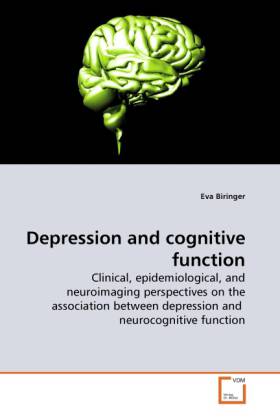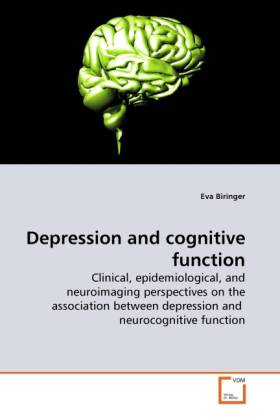
- Afhalen na 1 uur in een winkel met voorraad
- Gratis thuislevering in België vanaf € 30
- Ruim aanbod met 7 miljoen producten
- Afhalen na 1 uur in een winkel met voorraad
- Gratis thuislevering in België vanaf € 30
- Ruim aanbod met 7 miljoen producten
Zoeken
Depression and cognitive function
Clinical, epidemiological, and neuroimaging perspectives on the association between depression and neurocognitive function
Eva Biringer
Paperback | Engels
€ 48,45
+ 96 punten
Omschrijving
This book presents a PhD-thesis built around four original research papers that investigate the association between depression and neurocognitive function from different perspectives. Research during the past 30 years has shown that patients with unipolar depression often have lower neurocognitive function than healthy controls. However, there are still several questions with regard to the association between depressive symptoms and performance on neurocognitive tests that are unclear. Relevant questions to ask are: How strong is the association between depression and neurocognitive function? Does neurocognitive function improve upon remission of the depressive symptoms? Is neurocognitive function in depression relevant for patients' functioning? This book critically reviews the research literature in these fields, after giving a general introduction to the depressive syndrome and neuropsychiatric concepts and assessment. The book is easily accessible to scientists and clinicians without comprehensive knowledge of neuropsychiatry.
Specificaties
Betrokkenen
- Auteur(s):
- Uitgeverij:
Inhoud
- Aantal bladzijden:
- 120
- Taal:
- Engels
Eigenschappen
- Productcode (EAN):
- 9783639147254
- Verschijningsdatum:
- 25/08/2010
- Uitvoering:
- Paperback
- Formaat:
- Trade paperback (VS)
- Afmetingen:
- 152 mm x 229 mm
- Gewicht:
- 185 g

Alleen bij Standaard Boekhandel
+ 96 punten op je klantenkaart van Standaard Boekhandel
Beoordelingen
We publiceren alleen reviews die voldoen aan de voorwaarden voor reviews. Bekijk onze voorwaarden voor reviews.











